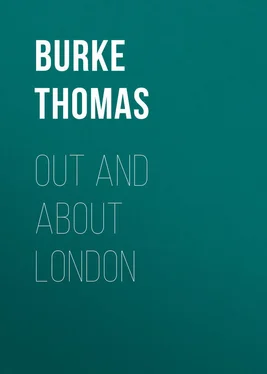Thomas Burke - Out and About London
Здесь есть возможность читать онлайн «Thomas Burke - Out and About London» — ознакомительный отрывок электронной книги совершенно бесплатно, а после прочтения отрывка купить полную версию. В некоторых случаях можно слушать аудио, скачать через торрент в формате fb2 и присутствует краткое содержание. Жанр: foreign_antique, foreign_prose, на английском языке. Описание произведения, (предисловие) а так же отзывы посетителей доступны на портале библиотеки ЛибКат.
- Название:Out and About London
- Автор:
- Жанр:
- Год:неизвестен
- ISBN:нет данных
- Рейтинг книги:5 / 5. Голосов: 1
-
Избранное:Добавить в избранное
- Отзывы:
-
Ваша оценка:
- 100
- 1
- 2
- 3
- 4
- 5
Out and About London: краткое содержание, описание и аннотация
Предлагаем к чтению аннотацию, описание, краткое содержание или предисловие (зависит от того, что написал сам автор книги «Out and About London»). Если вы не нашли необходимую информацию о книге — напишите в комментариях, мы постараемся отыскать её.
Out and About London — читать онлайн ознакомительный отрывок
Ниже представлен текст книги, разбитый по страницам. Система сохранения места последней прочитанной страницы, позволяет с удобством читать онлайн бесплатно книгу «Out and About London», без необходимости каждый раз заново искать на чём Вы остановились. Поставьте закладку, и сможете в любой момент перейти на страницу, на которой закончили чтение.
Интервал:
Закладка:
Here we received a touch or two from the old times. War has killed many lovely things, but, though it maim and break, it cannot wholly kill the things of the spirit, and in the "Royal" we found that art was still a living thing; ideas were still being discussed as though they mattered. Epstein and Augustus John, both in uniform, were there, and Austin Harrison had his usual group of poets. It was reassuring to see the old domino-playing Frenchmen, who seem part of the fixtures of the place, in their accustomed corner. The girls seemed to have packed away their affrighting futurist gowns, and were arrayed more soberly. That night they seemed to be more like human creatures, and less like deliberate Bohemians.
I am not overfond of the Café Royal, but it is one of the West End shows which visitors feel they must see; and when any provincial visitors wonder: "Why is the Café Royal?" I have one answer for them: "Henri Murger."
It is certain that, but for Murger, there would be no Chelsea and no Café Royal. That man has a lot to answer for. I doubt if any one man (I'm not including kings) has wrought so much havoc in young lives. He meant to warn youth of danger; he actually drove youth towards it.
Any discussion which seeks to name the most dangerous book in the world is certain to bring mention of Rousseau's Confessions , of Paine's Age of Reason , of Artzibashef's Sanine , of Baudelaire's Fleurs du Mal , and other works of subversive tendency. The one book which has really done more harm to young people than any other is seldom remembered in this connection. That book is Scènes de la Vie de Bohême ; and it is dangerous, not that it contains a line of obscenity or blasphemy, not that it teaches evil as higher than good, but because it founded a cult and taught young people how to ruin their lives. Bohemianism has, of course, existed since the world began; rebels have always been; but it remained for Murger to find a name for it and make a cult of it.
The dangers of this cult to young people lay not in its being an evil cult, but in its being perhaps as fine a cult as any of the world's great creeds: the cult of human sympathy and generosity. The Bohemian makes friends with all kinds and all creeds – sinners and saints, rich and poor; he cares nothing so long as they be kindly. And there lay the danger, for the blood of youth, freed from all restraint, was certain to overdo it. It became a cult of excess. Murger died, but he left behind him a very bitter legacy to the coming generation. As that legacy passed through the years it gathered various adhesions – such as Wilde's "In order to be an artist it is first necessary to ruin one's health," and Flaubert's "Nothing succeeds like excess"; so that very soon art colonies became things discredited, unpleasant to the nostrils of the righteous.
Murger himself saw the life very clearly, for he described it as "Vie gai et terrible"; and he takes no pains to present to us only the lighter, warmer side of it. He shows us everything; yet, so diabolical is his manner, that, even after passing the tragedy of the closing pages, the book and the life it pictures call to every one of us with song in his blood and the spirit of April in his heart.
It first appeared as a feuilleton in a Paris daily, and Murger, with characteristic insouciance, wrote his instalments only a few hours before the time when they were due for the printer; and when he was stumped for material, he invented a little story. Hence that singularly beautiful tale, slammed into the middle of the book – the Story of Francine's Muff – which forms the opening scene of Puccini's opera founded on the novel. The book has neither balance nor cohesion, and in this it catches its note from its theme. It is a cinematographic succession of scenes, tender and passionate and gay; swift and hectic. He invented and employed the picture-palace manner in literature before the picture-palace was even conceived. The very style is feverish, and from it one visualizes the desperately merry Bohemian slaving with pen and paper in his high garret, and whipping his flagging brain with fierce stimulant, while the printer's boy sits on the doorstep.
It stands alone. There is no book in the literature of the world quite like it. It is the challenge of youth and beauty to the world; and if we – grown wise and weary in the struggle – find a note of ferocity and extravagance in the challenge, then let us judge with understanding, and remember that it is a case of the fine and the weak against the brutal and the ignorant. Murger's voice is the voice of protesting youth. He is illogical; so is youth. He is furious; so is youth. He is heroic; so is youth. He is half-mad with indignation and half-mad with the joy of living; so is youth. It is by its very waywardness and disregard of values that the book captures us.
There is no other book in which the spirit of Paris breathes more easily. Here we have the essential Paris, just as in Thomas Dekker we have the essential London. Poets, novelists and essayists have set themselves again and again to ensnare the elusive Paris between the covers of a book; but Murger alone – though he writes of Paris in 1830 – has succeeded. Those who have never been to Paris should first read his book; then, when they do go, they will experience the sense of coming back to some known place.
It was this insidious book that first tempted youth to escape from a hidebound world; showed it the way out – a way beset by delightful hazards. It offered to all the golden boys and girls a new Utopia, and they were fain to visit it. That it was a false world troubled them not at all. The green glass, the delirious midnight hours, and the pale loveliness of Mimi and Musette were, perhaps, shackles as binding and as fearful as those of Convention. But anything to escape from the irk and thrall of their narrow realities; so away they went, and the end of the story is written in the archives of the Morgue.
After seventy years, however, the middle way has been found. There are few tragedies to-day in the Quartier Latin, and very little gaiety or kindliness; none of the old adventurous spirit. Things are going too well in the studio-world these days. Chelsea and Montmartre have been invaded by the American dilettanti, whose lives are one long struggle to be Bohemians on a thousand a year. If, however, there be those who regard this state of things as an improvement on the old, then let it be remembered that this way was only found after Murger had wrecked his own life and the lives of those who followed so gaily the unkind path down which he led them. It is a pitiful catalogue; the more pitiful since so many of the young dead are anonymous – the young men who might, had they lived, have given the world so much of beauty, but who were unable to pull up short of the precipice. Some of them, of course, we know: Gerard de Nerval, Barbey d'Aurevilly, Baudelaire, Verlaine, Ernest Dowson; and their London monument is the Café Royal.
At half-past nine all fun ceased, but we had picked up a bunch from Fleet Street, one of whom was taking home two bottles of whisky. So we moved to "another place," and ordered black coffees which drank tolerably well – after some swift surreptitious business with a corkscrew. Later, we strolled across Oxford Street to what remained of the German Quarter. We visited various coffee-bars, where our genial comrade with the bottles again did his duty; did it beautifully, did it splendidly, did it with Vine Street at his ear. And in a grey street off Tottenham Court Road we found a poor man's cabaret. In the back room of a coffee-bar an entertainment was proceeding. Two schonk boys, in straw hats, were at a piano, assisted by an anæmic girl and a real coal-black coon, who gave us the essential rag-times of the South. The place was packed with the finest collection of cosmopolitan toughs I had ever seen in one room. The air, physical and moral, was hardly breathable, and as the boys were spoiling for a row, one misinterpreted glance would have brought trouble – and lots of it. At different tables, voices were raised in altercation, when not in lusty song, and the general impression the place gave me was that it was a squalid, dirty model of the old Criterion Long Bar. All the meaner, more desperate citizens of the law-breaking world were gathered here; and, though we had broken a few by-laws ourselves that night, we were not anxious to be led into any more shattering of the Doraic tables. So at midnight we adjourned to "another place," and drank dry gingers until three o'clock in the morning. Then, to a Turkish Bath, and so to bed; not very merry, but as cheered in the spirit as the humble, useless citizen is allowed to be in a miserable, hole-and-corner way in war-time.
Читать дальшеИнтервал:
Закладка:
Похожие книги на «Out and About London»
Представляем Вашему вниманию похожие книги на «Out and About London» списком для выбора. Мы отобрали схожую по названию и смыслу литературу в надежде предоставить читателям больше вариантов отыскать новые, интересные, ещё непрочитанные произведения.
Обсуждение, отзывы о книге «Out and About London» и просто собственные мнения читателей. Оставьте ваши комментарии, напишите, что Вы думаете о произведении, его смысле или главных героях. Укажите что конкретно понравилось, а что нет, и почему Вы так считаете.












